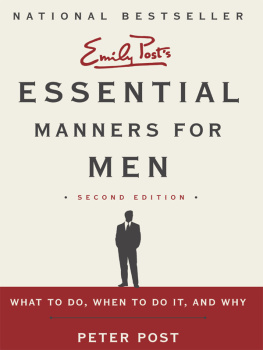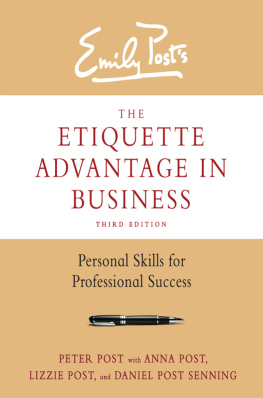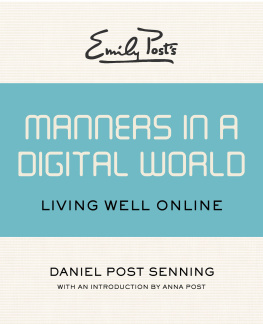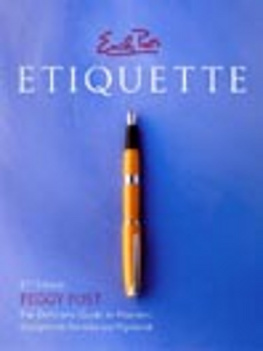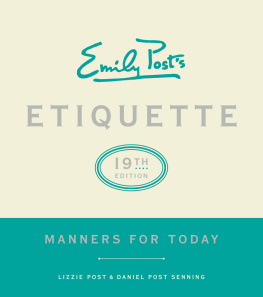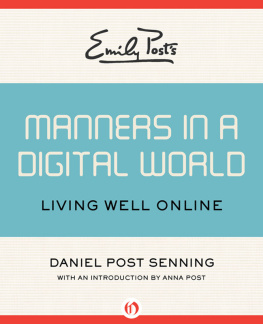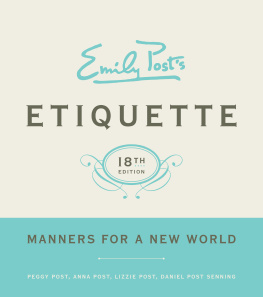For thirty-nine years we have lived together, shared children, owned a business together, gone shopping every week together, renovated one house and built another together. She introduced me to two of the passions of my life: Italy and yoga. We have worked together at The Emily Post Institute for the past ten years. She edits virtually everything I write. She knows and lives by what etiquette is as well as any person I know. Certainly she has corrected me more than a few times, and, as much as I hate to say it, she was almost always right.
Throughout this book she is referred to as my wife.
But here, it is my pleasure to thank Tricia for all her help and patience working with me on my columns and blogs and in making this book possible.
A lot of water has gone under the bridge since Essential Manners for Men was first published in October 2003. Then, metrosexual was the watchword and Queer Eye for the Straight Guy was a runaway success as one of the newest reality television series. All of a sudden the focus was on men and their self-improvementand men were finally waking up.
This isnt surprising to me. Since 2003 Ive conducted seminars around the country for corporations, government entities, and universities. Without exception, every one of those seminars was filled with men who wanted to know what to do in their personal and professional lives to help them be as successful as possible.
These men engage me during the seminars, and they want to have their questions answered afterward as well. The questions always come back to one concept: I want to look like I know what to do. I dont want to be embarrassed. Men crave that sense of confidence that comes from being sure of how to actbecause once theyre sure, they can turn their focus to the people they are with and to building the relationship. When they are hesitant and unsure, they look lost, and they know it.
For me, the best part of having written this book is the opportunity Ive had to change peoples lives. When the first edition was released, it was timed to be a great gift bookand it was. Parents repeatedly told me how they liked to observe which present caught their sons attention on Christmas morning. They were amazed to find their sons off in a corner, reading the book, page after page.
One young man wrote me. It seems his life was going down the tubes. His relationship with his wife was on the rocks, and he was despondent. He got hold of a copy of the book, read it, and then read it again. He saw himself in the situations and began to make some course corrections. He was writing to tell me that the changes he was making had markedly improved his relationship with his wife, and they were now planning a commitment ceremony to renew their wedding vows. Now, Im not sure I planned on my book having quite such a dramatic effect on anyones life, but Im awfully glad it helped him turn his marriage around.
Today, there is a growing response to the rudeness and incivility that so characterizes contemporary American life, and it has been expressed from the president on down. Etiquette provides us with a path to civility and positive relationships in all aspects of our lives. Like it did for that young man, etiquette allows each of us to recommit to building a better, more joyful life. And thats not bad for three simple words: consideration, respect, and honesty.
Peter Post
Charlotte, Vermont
Just recently I was conducting a seminar for a law firm. The room was filled with fifty participants, most of whom were young associates. I was showing the group the books I would raffle off at the end of the session when I came to a copy of Essential Manners for Men . As soon as I announced the title, a hush went over the room and then a soft sound emergedthe sound of fifty voices snickering in unison.
Yes, I know. Men could use manners. And yes, its really funny thinking that any man would bother to read the book. Yet they didin numbers great enough that it actually landed on the New York Times bestseller list for advice books.
What Ive learned after talking to countless men about etiquette is that they really do want information. They want it in a nonjudgmental fashion. They want to hear the ideas and then make up their own minds about what advice theyll adopt. And they need to understand why. Without a why behind the advice, theyll never change a behavior.
S URVEYS IN 2002 AND 2011
In order to understand what men do well and where theyre screwing up, I conducted a survey in 2002 for the first edition and then repeated it in 2011 for the second edition. The surveys focused on daily life, social life, and work life, and most of the questions were the same so as to identify trends over time.
Some issues, such as treating women with respect and the importance of manners, held true over time, while others, like putting the toilet seat down, have clearly changed over the last decade. The chapters that follow will delve into those similarities and differences.
In addition, one sweeping change occurred: Men, especially younger men, are hungry for information that will help them be more successful personally and professionally. Ive seen it over and over in the seminars, speeches, and interviews I give, but I didnt have any concrete data to back it upuntil now.
While only 14 percent of the respondents in 2002 were men, men made up 46 percent of the 2011 survey. That is a huge shift. Bear in mind that we let the public know about the survey through our monthly newsletter, our Web site, our Facebook page, our Twitter page, and by word of mouth. The majority, if not vast majority, of people we touch this way are women. Yet somehow men found out about the survey, and they responded. Perhaps girlfriends pointed it out to them. Or significant others suggested they take the survey. Frankly, I dont know. What I do know is men responded. And in having those responses, I could look at differing opinions between men and women. Those differences are mentioned throughout the book.
SURVEY SAYS
When You Behave Well, People Notice
To learn more about how people viewed mens behavior, in 2002 we posted four surveys on our Emily Post Institute Web site: daily life, social life, work life, and special occasions. The results of those surveys helped delineate the topics in the first edition. In 2011 we surveyed daily life, social life, and work life again to see what had changed.
Most striking was the increase in the percentage of male respondents. In 2002 only 14 percent were men, while in 2011, 46 percent were men. And 44 percent of the men were twenty to twenty-nine years old.
Young men who responded to the 2011 survey affected the total number of married respondents. In 2002, 66 percent were married but in 2011 that number dropped to 53 percent. Conversely, the number of Single, never been married respondents jumped from 16 percent in 2002 to 30 percent in 2011.
For all the variations in gender, age, and marital status, one consistent theme emerged in both sets of surveys: Women want men to treat them with respect, and they notice and value men who have good manners. When a man treats others with respect, his image shines in their eyes.
The 2011 survey also saw an increased emphasis on cleanliness. Women didnt just bash on men, they also let us know what impresses them. Interestingly, men who dont leave a mess and who help clean up got very high marks.

